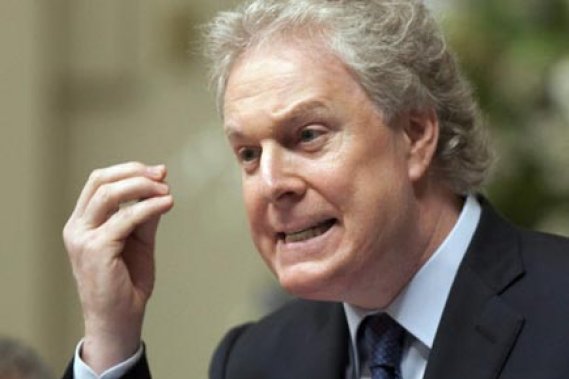It’s membership time. Cultivate Canada’s media. Support rabble.ca. Become a member.
Most thought it was over, done with, and good riddance too. What in Quebec was called La Grande Noirceur (The Dark Era), the reign of Maurice Duplessis and his Union Nationale government was to have ended with the death of le Chef (the Chieftain).
Few doubted the 1960s’ Quiet Revolution represented a democratic turn, and a new beginning. Under Premier Jean Lesage, with René Levesque championing nationalized electricity, it was agreed the election of a progressive Quebec Liberal party ensured the old paternalist order was gone, forever.
Except that Quebec is now living through La Petite Noirceur (Dark Era Lite). The choice of a failed federal Conservative leader, Jean Charest, to head the Quebec Liberal party, and the 2003 election which carried him to power, ended up turning back the clock. In today’s Quebec, Charest is playing Duplessis, and the Liberals are acting as the Union Nationale, complete with alleged scandals in the construction industry Premier Charest was forced to acknowledge by creating a public commission of inquiry (after resisting for two years).
The Liberals have weakened Quebec’s progressive income tax with user-pay schemes, and consumption taxes, gifting the wealthy and soaking everybody else. A $950-million cut in income taxes was announced in May 2007. It was easily funded from a $2.3-billion transfer announced two months earlier by the Harper government, to compensate for a “fiscal imbalance” attributable to previous federal Liberal policies.
A Leger poll found the tax cut was unpopular in Quebec, and opposed by 70 per cent of respondents. Many people must have sensed what was coming next: new charges for public services.
CEGEP and university students, who object to taking on debt to finance their education, have protested for months a proposed 75 per cent tuition increase over five years (since increased to 82 per cent over seven years).
Jean Charest believes that post-secondary students should pay a greater portion of their studies up front, as tuition increases. In effect, his government would move Quebec away from what his own party had introduced when it created the junior college CEGEP system — more open access to advanced education — and towards education as a private consumption good to be paid for by students. The Liberals’ main rivals, the PQ, at one time supported zero tuition in the name of improved access to post-secondary education, and its public benefits.
Under opposition leader Pauline Marois, the PQ have joined student leaders in opposition to the Charest tuition hikes. The students also have the support of the left-wing Québec Solidaire.
The Charest Liberals were first elected because the PQ government introduced a poorly conceived municipal amalgamation scheme which turned out to be very unpopular. Charest allowed municipalities that wished to remain autonomous to do so. But the Liberal leader failed to grasp that his mandate was to replace the PQ. No one had asked him to bring U.S. Republican economics to Quebec.
One of the first initiatives of the Charest government was to encourage private, for-profit child-care operators. This was rightly seen as a frontal attack on the widely popular $5-a-day child-care program. People took to the streets in large numbers and blocked the government, which had to settle for a $2 increase in the daily fee.
Charest hoped to get away with privatizing the Mount Orford public park, a jewel of the Eastern townships, where his Sherbrooke political base is located. The deal failed in the face of public disgust over turning over a beautiful natural environment to commercial real estate developers looking for a quick return.
Overall, in renewing his mandate twice, Charest had to moderate his policy preferences. In the context of post-1995 referendum trauma, the Quebec population were wary of a return to a PQ regime committed to a third referendum, which gave the Liberals an electoral advantage. Still, a break-away Liberal youth leader by the name of Mario Dumont, managed to mount a challenge, and at the head of his upstart party became leader of the opposition, while Charest headed a minority government in his second term as premier.
In his third mandate, free of minority status, Charest has reverted to the Reaganite policies of his federal Conservative political mentor, Brian Mulroney. Charest tried to introduce extra-billing for health care, but his finance minister Raymond Bachand was forced to withdraw the measures in face of opposition.
Just days before the premier and Education Minister Bachand announced last week the break-off of negotiations with student federation leaders, a CROP Radio-Canada poll showed that only 27 per cent of Quebecers agreed with the Charest tuition hike proposal. Fully 45 per cent thought tuition increases should be limited to the standard of living, while 13 per cent supported a freeze on fee increases, and another 11 per cent wanted free tuition. In short, 68 per cent stand against the Liberals.
Thanks to a poor turnout rate, the Charest Liberals won their legislative majority in the last election with the voting support of only 23 per cent of registered voters, just a few less than the 27 per cent who support their proposed fee hikes.
Charest must go to the polls within 18 months. Most expect him to try to win re-election this fall, giving the recent CAQ (Coalition Avenir Québec) put together by former PQ minister François Légault less time to raise money, and get itself organized. As well, Charest wants to campaign before too many findings from the corruption inquiry hit the public airwaves.
In the next election, as well as the PQ, Québec Solidaire, and the CAQ, the Liberals will also have to battle the ghost of Duplessis.
Duncan Cameron is the president of rabble.ca and writes a weekly column on politics and current affairs.



